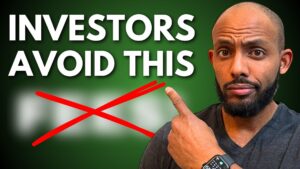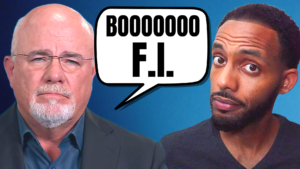Should you stop investing or should you keep investing while you’re trying to get out of debt? This is a really great question that I get from time to time: “Matt, should I stop investing while I’m trying to get out of debt?” And really this boils down to your specific situation.
I will tell you what my wife and I did as a family that helped propel ourselves to becoming financially free. We’re not there yet, but we’re 100% on that path to becoming financially free in our 40s. So we were looking at more than $200,000 of student loans, and at the same time I was investing in my 401k.
Now part of our journey was looking at the Dave Ramsey plan. Dave Ramsey suggests stopping all investing while you get out of debt. That’s his “Baby Step” two. Personally, I don’t mind that. I like that idea. I like that philosophy, because if you’ve got interest rates on your debt that you’re having to pay upwards of 15%, 20%, 25% that’s a lot of money that you’re going to be paying in interest, and if you can stop investing for a little bit, then you can pay off those student loans, those credit cards, or whatever debt you have. And so you pay off your debt aggressively, reduce the interest you’re paying to 0, and eventually become debt free.
Now you get that interest back to you. Because if you pay that credit card debt off, guess what? That credit card that’s accruing a 15% interest is back in your pocket. So you’re getting that 15% back. So that’s one side of the argument I like to look at.
And one question that I do have for you before you dive into this topic, is are you getting a match at your workplace for your retirement savings plan? Because if you are then I would challenge you to look at the match that you’re getting at work. Maybe it’s a 3% match or a 6% match. Make sure that you’re take advantage of the match you’re getting at your workplace with your 401k, 403b, or whatever retirement plan that you have at work, if there is a match being offered.
I think a retirement savings plan that comes with a match is a really great opportunity to take advantage of because you don’t want to miss out on the match. You don’t want to miss out on that “free money.” I call it “free money,” because you have to contribute some money into the plan to get that match from the company you work for.
And even if the match is 2%, 3% or 5% you should still look into contributing that amount. I don’t think it’s going to hurt you in the long run, because you’re of the mindset that you’re getting out of debt, that you’re paying it off, that you’re working hard to just get financially free. At the same time that’s a great way to educate yourself on the process of investing and on the knowledge of your retirement savings plan. I don’t think there’s anything wrong with taking advantage of a company match, especially when you consider compound interest working in your favor the earlier you start.
So what did my wife and I do as we began our journey to becoming debt free? Well, in the beginning I stopped investing in my 401k. Yup. I did that and then a few months before we actually got out of debt, I actually started investing back in and contributing back into my 401k up to the match.
When we finally paid off the debts, I increased what I was contributing to my 401k. We also, finally started contributing and investing in my wife’s 401k plan at her job.
Now looking back, I believe stopping the investing into my 401k was the best choice for us, especially as the family was quickly growing. We needed the mindset and the urgency to become debt free quickly. That was our focus and I think for many of you young people, newly married people and even folks who are a little bit older, getting out of debt is such a huge catalyst to jumpstart your path to financial freedom.
So if you have any questions with about this debate of whether you should stop investing while I getting out of debt ask away! I’ll do my best to get to your questions and answer as I can.
Kyle Glenn

